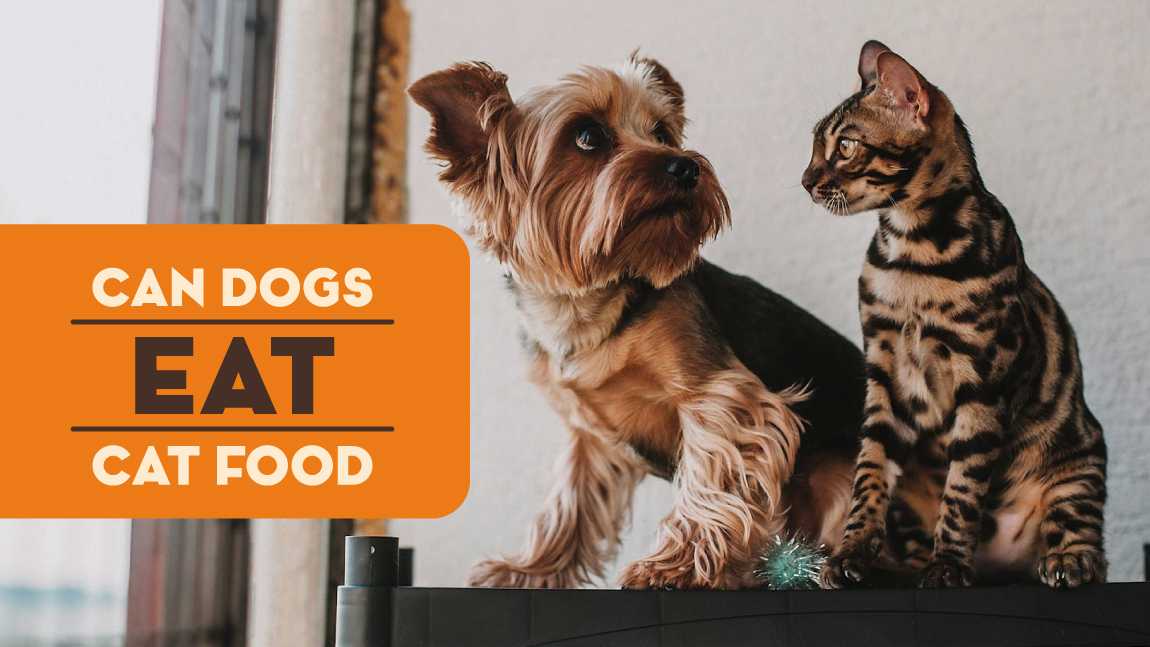Picture this: you just spotted your dog eating cat food. Cat food!
What do you do? Do you take away the cat food and discipline your dog? Do you “let the dog be a dog” and ignore the behavior? Do you panic and take him to the vet immediately?
The answer is simple: when cat food is consumed once, it isn’t an issue, but more than once is when it becomes a problem. Cat food is unsuitable for long-term consumption by dogs as it can lead to nutritional imbalances, weight gain, digestive issues, liver disease, and many other health issues.
Today, we’re going to discuss the differences between required nutrients for cats and dogs, go over the risks of your dog eating cat food, and tips for feeding cats and dogs together. Here we go!
How Dog Nutrition and Cat Nutrition Are Different
The main reason you don’t want to let your dog eat cat food is that each species has different nutritional needs.
Dogs are omnivores, meaning they require a balanced diet of protein, carbohydrates, fats, vitamins, and minerals to thrive. They can derive their nutritional needs from a variety of sources, including meat, grains, fruits, and vegetables. Commercial dog food is formulated to meet the specific nutritional needs of dogs, providing a balance of protein, fats, carbohydrates, vitamins, and minerals.
On the other hand, cats are carnivores, meaning they require a diet high in animal protein and fat. Cats have specific requirements for nutrients like taurine, which is essential for their health (while it’s not essential for dogs). As such, commercial cat food, such as Supreme Source’s Whitefish Meal and Salmon cat food, is specifically designed to meet the high protein and fat requirements of cats.
Put another way, it’s like giving dogs the equivalent of a juicy hamburger or other guilty pleasure. It may taste great every time, but long-term, it’s probably not the best for their health.
Risks of Dogs Eating Cat Food Long-term
Let’s talk about the risks of dogs eating cat food long-term. First, dogs won’t get the essential nutrients and vitamins they need. Once in a while, this is fine, but over time, dogs consuming improper food has the potential to cause gastrointestinal issues, increased risk of obesity, pancreatitis, and/or exacerbated stomach, kidney, or liver issues (especially for dogs who have related diseases).
So then, how do you see to it that your dogs don’t eat cat food? We’ve got some tips for you!
Tips for Feeding Cats and Dogs Together
- Separate Feeding Areas. When it comes to feeding cats and dogs together, it’s important to prevent your dog from accessing the cat’s food. This can be as simple as feeding them in separate rooms or using pet gates to separate their eating spaces. Doing so ensures that the cat’s food remains out of reach for the dog and reduces the temptation for them to indulge in it (Even without getting a taste for it, the smell can entice dogs to munch on meals intended for their feline roommates).
- Supervise Meal Times. Another helpful tip is to supervise meal times. This allows you to watch both pets while they eat and intervene if necessary. Doing this can prevent the dog from sneaking into the cat’s food bowl and vice versa.
- Separate Meal Times. If you’re not into supervising your pets’ feeding time, consider separate meal times for each pet so that the temptation isn’t as in their face.
- Choose High-Quality Dog Food. Providing high-quality dog food is essential for meeting your dog’s nutritional needs, which in turn reduces the likelihood of them seeking additional nutrients from the cat’s food. Opt for a well-balanced dog food that contains the right amounts of protein, carbohydrates, fats, vitamins, and minerals.
- Provide a Balanced Diet for Both. Ensure that both your cat and dog are receiving a balanced diet. By providing a well-rounded, varied diet for both pets, you decrease the risk of them being tempted to consume each other’s food. Consult with your veterinarian to determine the specific nutritional needs of each pet and choose appropriate food options accordingly.
By following these tips and being mindful of the differences in nutritional needs between cats and dogs, you can ensure that your pets get the proper nourishment and prevent your dog from eating cat food.
Final Thoughts: “Can Dogs Eat Cat Food?“
Your dog will probably be fine if they eat cat food once or twice. If they were starving and it was the only thing available, they’d probably be ok. If they’re gorging on it regularly, however, health issues can, and probably will, occur.
In other words, don’t let your dog make it a habit.
We have a couple of other notes to consider. First, just because you’re not seeing obvious symptoms, doesn’t mean it’s not impacting your dog’s health. Second, every animal is different. Some animals have more sensitive stomachs than others. If you see something concerning, like diarrhea, vomiting, lethargy, fever, or the like, please seek out your vet immediately.
Third and finally, please seek out a vet or veterinary nutritionist before giving your dog cat food or human foods (even as a treat), because they’re better equipped to handle your specific dog’s needs.
Keep your dog happy and healthy, and he’ll live with you for many years to come!
Also, if your cat eats dog food (oh no!), see our article: Can cats eat dog food?

